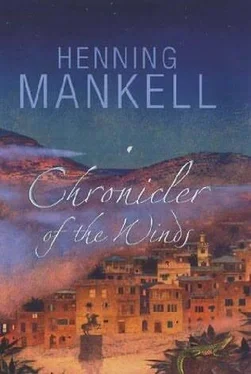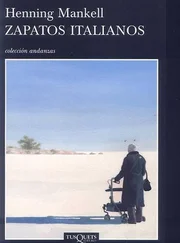
Henning Mankell
Chronicler Of The Winds
© 2006
Translated from the Swedish by Tiina Nunnally
The human being has two eyes;
one sees only what moves in ephemeral time, the other
what is eternal and divine.
ANGELUS SILESIUS
If this is the best of all possible worlds,
what must the others be like?
VOLTAIRE, Candide
When there were no depths,
I was brought forth;
when there were no fountains abounding with water.
Proverbs 8:24
Prologue: José Antonio Maria Vaz
On a rooftop of sun-scorched, reddish clay on a sultry, humid night beneath the starry tropical skies, I who bear the name José Antonio Maria Vaz stand waiting for the world to end. I am filthy and feverish, my clothes are hanging in tatters, as if they were in wild flight from my gaunt body. I have flour in my pockets, which for me is more precious than gold. A year ago I was still somebody, a baker; whereas now I am nobody, a beggar roaming aimlessly beneath the searing sun in the daytime and then spending the endless nights on a desolate rooftop. But even beggars possess traits that give them an identity, that distinguish them from all the others on the street corners who hold out their hands, as if they wanted to give them away or sell their fingers, one by one. José Antonio Maria Vaz is the vagrant who became known as the 'Chronicler of the Winds'. Day in and day out, my lips move without cease, as if I were telling a story to which no one has ever bothered to listen. As if I have finally accepted that the monsoon which sweeps in from the sea is my only listener, always attentive, like an old priest waiting patiently for the confession to come to an end.
At night I retreat to this deserted rooftop, since here I feel I gain both space and a viewpoint. The constellations are mute, they do not applaud me, but their eyes flash and I feel as if I can speak straight into the ear of eternity. And I can look down and see the city spread out before me, the city of night, where uneasy fires flicker and dance, unseen dogs laugh, and I wonder about all the people down there asleep, breathing and dreaming and making love, while I stand on my roof and talk about a person who no longer exists.
I, José Antonio Maria Vaz, am also part of this city which clings to the slopes down the wide estuary. The buildings perch like monkeys along the steep banks, and for each day that passes, the number of people living there seems to swell. They come wandering from the unplumbed interior, from the savannah and the remote, dead forests, down towards the coast where the city lies. They settle there and do not seem to notice all the malevolent glances that meet them. No one can say with certainty what they will live on or where they will find a roof over their heads. They are swallowed up by the city, become a part of it. And every day more strangers arrive, all with their parcels and baskets; the statuesque black women with enormous cloth bundles atop their noble heads, walking along the horizon like lines of small black dots. More and more children are born, more buildings clamber along the steep slopes, to be washed away when the clouds turn black and the hurricanes rage like murderous bandits. This is the way it has been for as long as anyone can remember, and there are many who lie awake at night, wondering how it will end.
When will the city crash down the slopes and be swallowed by the sea?
When will the weight of all the people finally become too great?
When will the world come to an end?
Once I too, José Antonio Maria Vaz, would lie awake at night and ask myself these questions.
But no longer. Not since I met Nelio and carried him up to the roof and watched him die.
The anxiety that I sometimes felt is now gone. Or rather, I have come to understand that there is a crucial difference between feeling afraid and feeling anxious.
That was something else that Nelio explained to me.
'If you're afraid, it's like you're suffering from an insatiable hunger,' he said. 'But if you're anxious, you can fight off your anxiety.'
I think about his words, and I now know that he was right. I can stand here and look out over the night-time city, the fires flickering uneasily, and I can recall everything he told me during those nine nights that I spent with him and watched him die.
This rooftop is a vital part of the story. I feel as if I were at the bottom of the sea; I have sunk down and can go no further. I am at the bottom of my own story; it was here, on this roof, that it all began and it all ended.
Sometimes I imagine my task to be this: that for all eternity I will wander at the bottom, on this roof, and direct my words to the stars. Precisely that will be my task, for ever.
So here is my strange story, a story impossible to forget.
It was on that night a year ago, near the end of November, when the moon was full and the night was clear after the heavy rains, that I placed Nelio on the filthy mattress where nine days later, as dawn broke, he would die. Since he had already lost a great deal of blood, the bandages – which I did my best to fashion from strips that I tore from my own worn clothing – did little good. He knew long before I did that soon he would no longer exist.
That was also when everything started over, as if a peculiar new way of measuring time was suddenly established. I remember that quite clearly, even though more than a year has passed since then and many other things have happened in my life.
I remember the moon against the dark sky.
I remember it as a reflection of Nelio's pale face on which salty beads of sweat glittered as the life left his body slowly, almost cautiously, as if trying not to wake someone who was asleep.
Something important came to an end on that early morning, after the ninth night, when Nelio died. I have a hard time explaining what I mean. But at some moments in my life I feel as if I am surrounded by a vast emptiness. As if I were inside an enormous room made of invisible membranes from which I cannot escape.
That was how I felt on the morning when Nelio lay dying, abandoned by everyone, with me as the only witness.
Afterwards, when it was over, I did as he had asked me to do.
I carried his body down the winding stairs to the bakery, where the heat was always so intense that I never got used to it.
I was the only one there at night. The huge oven was hot, awaiting the bread that would soon be baked for the hungry day to follow. I shoved his body into the oven, closed the door, and waited for exactly one hour. That's how long it would take, he had said, for his body to disappear. When I opened the door again, there was nothing left. His spirit blew past me like a cool gust from the heat of the inferno, and then there was nothing more.
***
I went back up to the roof. I stayed there until night fell again. And it was then, beneath the stars, in the faint moonlight, with the gentle breeze from the Indian Ocean brushing my face, in the midst of my grief, that I realised I was the one who had to tell Nelio's story.
Quite simply, there was no one else who could do it. No one but me. No one at all.
And the story had to be told. It could not be left lying there like some abandoned and cast-off memory in the storerooms that are housed in every human brain.
The fact is that Nelio was not merely a poor, filthy street boy. Above all else, he was an unusual person, elusive and enigmatic like a rare bird that everyone talks about but which no one has actually seen. Though he was only ten years old when he died, he possessed the experience and wisdom of someone who had lived to be a hundred. Nelio – if that was his real name, because from time to time he would surprise me by calling himself something else – wrapped himself in a magnetic field that no one could see or penetrate. Everyone treated him with respect, even the brutal policemen and the always nervous Indian shopkeepers. Many sought his advice or hovered timidly nearby in the hope that some scrap of his mysterious powers would be transferred to them.
Читать дальше













